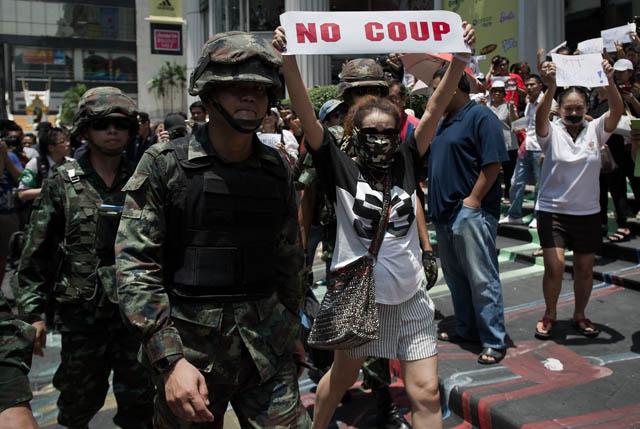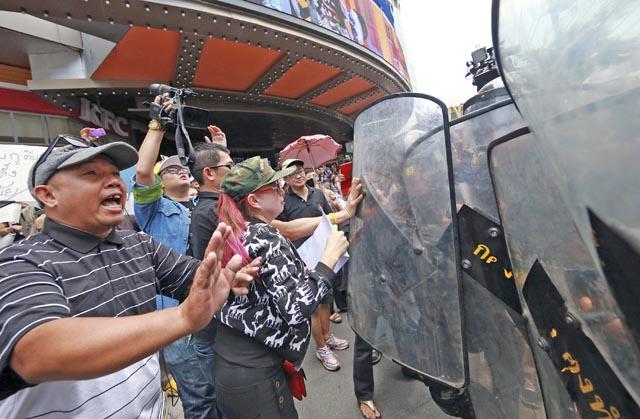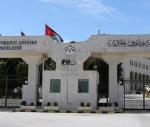You are here
Junta ultimatum for defiant Thai anti-coup protesters
By AFP - May 25,2014 - Last updated at May 25,2014

BANGKOK — Thailand’s ruling junta warned protesters it would not tolerate any further rallies against its coup after tense standoffs Sunday between soldiers and angry crowds, and said demonstrators would be held for one or two days, but could be jailed for up to two years if they kept taking to the streets.
“We will give them a last chance today, but if they continue to rally we will use measures to deal with them,” Lieutenant General Apirat Kongsompong told a press conference.
‘I am not afraid of them’
Protests began outside a Bangkok shopping mall in the Chidlom area, where boisterous demonstrators brandished signs reading “Junta Out” and “F*** Coup” and pushed armed troops.
Minor scuffles broke out and at least two protesters were taken away by the troops, one bleeding, according to AFP journalists.
Demonstrators then made their way across the city to the Victory Monument cheered by onlookers, defying a junta call to avoid protests and a martial law ban on gatherings of more than five people.
“I am not afraid of them because the more we are afraid of them, the more they will stamp on us,” protester Kongjit Paennoy, 50, told AFP. “We want an election — to choose our own boss.”
The junta on Saturday announced it had disbanded the Senate and placed all law-making authority in the hands of army chief General Prayut Chan-O-Cha.
Civil liberties have been curbed, media restrictions imposed and most of the constitution abrogated.
Bangkok has seen several smaller outbreaks of protest against the junta since Prayut launched his takeover on Thursday.
Witnesses also reported demonstrations overnight in parts of the Shinawatra family’s northern power base, with rallies in the city of Khon Kaen and a heavy military presence in Thailand’s second largest city Chiang Mai.
The military intervention is the 19th actual or attempted coup in the kingdom since 1932.
It follows seven months of anti-government protests that derailed elections in February and sought to eradicate the influence of Yingluck’s divisive brother Thaksin Shinawatra, who was ousted from power by royalist generals in a coup in 2006.
He has been in exile since 2008 but critics said he still controlled supportive governments, including his sister’s, from overseas.
Political figures detained
Those being held by the junta include politicians and leaders from both sides of the country’s warring protest movements.
Analysts see the latest developments as an ominous signal that the army is digging its heels in and may be unwilling to hand over power to a civilian government in the near term.
Thailand has been rocked by persistent and sometimes violent political turmoil for nearly a decade, with the protests preceding the latest coup leaving 28 people dead and hundreds wounded.
Yingluck was ousted by a court ruling earlier this month, but her embattled government remained in place till last week.
Thaksin or his allies have won every election this century, thanks to their strong support among the working class and communities in the north and northeast.
But he is reviled by parts of the elite, the Bangkok middle class and southerners — an alliance with wide influence in the establishment and army but little electoral success.
The tycoon-turned-politician posted his first public messages on Twitter since the coup on Sunday, saying he was “saddened” by the coup and urging the military rulers to “abide by international law and respect human rights”.
The military said Saturday that Prayut had sent a letter about his takeover to the revered but ailing king, Bhumibol Adulyadej. It said the king had “acknowledged” Prayut’s letter but stopped short of describing the response as an endorsement
The monarch, 86, commands great respect and his blessing is traditionally sought to legitimise Thailand’s recurring military takeovers.
The army on Sunday said it would begin paying off outstanding debts of 92 billion baht ($2.8bn) to farmers racked up in a controversial rice subsidy scheme under Yingluck’s government.
The scheme has weighed on the public purse as the economy stutters — shrinking 0.6 per cent year-on-year in January-March — amid falling consumer confidence and a tourist slump as the political crisis takes its toll.
Washington, long a key ally, has led international condemnation of the coup.
It has suspended $3.5 million in military assistance, cancelled official visits and army exercises and said its remaining Thai aid budget was under question.
Related Articles
Thailand’s coup leaders said Saturday that they would keep former prime minister Yingluck Shinawatra, Cabinet members and anti-government protest leaders detained for up to a week to give them “time to think” and to keep the country calm.
Thailand’s embattled premier will be charged with neglect of duty, anti-graft officials said Tuesday, as clashes between police and opposition protesters left four dead, and dozens wounded in central Bangkok.
Thailand announced Tuesday the end of a nearly two-month-old state of emergency in Bangkok and surrounding areas, hoping to lure back foreign visitors following an easing of deadly political protests.


















